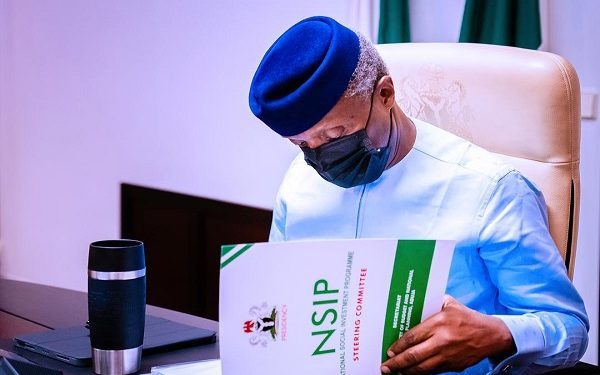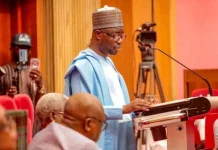Nigeria’s Vice-President Yemi Osinbajo has stated that President Muhammadu Buhari will adopt the use of a simple, commonsense strategy to alleviate 100 million Nigerians out of poverty.
The Spokesman to the Vice-President, Laolu Akande, quoted Osinbajo as saying in a statement on Friday.
President Muhammadu Buhari had established a national poverty reduction with growth strategy (NPRGS) steering committee three weeks earlier, following the approval of the federal executive council (FEC) in April.
Osinbajo stated during his speech session at the inaugural meeting of the steering committee in Abuja, that the committee would improve the adoption of commonsensical approaches in achieving its objectives.
He stated that in order to achieve a different result, the committee will be deliberate about its objectives and how to achieve them.
“I really want us to approach this as much as possible, commonsensical so that we are able to resolve all the issues and focus on the real progress,” he said.
READ ALSO: Nigerian Newspapers: Latest Business News Headlines For Today July 10, 2021
“I want us to look beyond all of what we are going to be doing, there is going to be a considerable amount of paperwork, but a lot of common sense is what grows economies.
“It’s what other countries have done, not really reinventing the wheel. So, I want us to focus on those commonsensical things so that we can actually move forward.”
Osinbajo made reference to Bangladesh’s poverty reduction strategy example in which he cited how the country’s manufacturing sector was crucial to its development.
He stated that the committee will consider opportunities in the agricultural sector and how funding can be accessed to explore them.
“Bangladesh actually exports more garments than we export oil,” he said.
“Countries that have managed to get out of poverty have created a lot of jobs through industries, and they have developed intentional strategies.
“We must look at what others have done, the smart things that other people have done, and adopt,” Osinbajo added.
“I think we really need to take a deep dive because governments have made several efforts at poverty alleviation but generally speaking, they have not yielded the sort of results they should yield, and I think it’s because there is a lot of focus on documentation and paperwork and very little commonsense approaches.”
Osinbajo explained that the NPRGS is a national strategy that every tier of government must key into.
He also added that the private sector must also collaborate with the government to reduce unemployment and lift Nigerians out of poverty.
“I just want to emphasize that it is a national strategy as opposed to a federal strategy which is why the steering committee is made up of federal as well as state officials,” he said.
“Essentially, this effort must also be directed at how to facilitate private sector creation of jobs. The fact is that there is no way that the Federal Government or the State Governments can create the number of jobs that we need.
“We need to take a few broad looks at the features of what constitutes our present predicaments in terms of job losses and unemployment.”
Members of the steering committee at the meeting include Kayode Fayemi, Babagana Zulum, and Abdullahi Sule, governors of Ekiti, Borno, and Nasarawa states, respectively.
Others are Boss Mustapha, secretary to the government of the federation; Muhammad Nanono, minister of agriculture; Niyi Adebayo, minister of industry, trade and investment; Chris Ngige, minister of labour and employment; while Prince Clem Agba, minister of state for budget and national planning, joined the meeting virtually.












